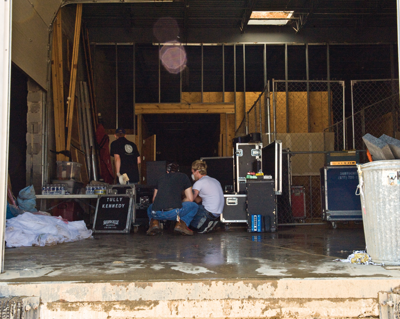
Tully Kennedy cleaning out his storage area at Soundcheck on May 7, 2010
Soundcheck Nashville is the largest music rehearsal, instrument rental, cartage and storage facility in the Southeast. It was also very nearly one of the largest casualties of the 2010 flood.
Located on the lip of the Cumberland, the facility was underwater in the days following the Nashville flood. Equipment owned by tenants such as Keith Urban and Brad Paisley was ruined, as was gear belonging to scores of Nashville's rank-and-file musicians. Damages reached well into the millions.
For Soundcheck owner Ben Jumper, his life's savings were wiped out overnight. He gambled, though, that his business would survive.
"We've built it once, we can build it again," he told the Scene in 2011. But despite his confidence, he still had doubts.
"I didn't know if we were really going to survive at all a year after the flood," he tells the Scene today. "I had bet the farm that we would. ... I thought it was 10 years away from recovery."
In the end, it took just a little over four. On the fifth anniversary of the flood, Soundcheck isn't just back to pre-flood numbers and pre-flood business, it's growing. The facility currently plans to undertake a 30,000-square-foot expansion for July that includes building more lockers and three more studios.
"We only survived because of the community that we have in Nashville and the community [support] that we have from the local business community," Jumper explains, also citing sponsors and gear manufactures such as Gibson, Fender and Shure that supported Soundcheck during a massive rebuilding effort following the flood.
"They all came to our aid," he says. "And the artists came back."
Kenny Chesney was the first big client who returned to Soundcheck to rehearse. Vince Gill was the first to come back and store his gear. The majority of the facility's tenants followed suit — the majority.
"There are some that don't trust our river anymore that didn't come back," Jumper recalls. "They don't trust the river or the handling of the water system. But those buildings had never been wet before, and they've been there for 45 years."
Still, Jumper can relate to former clients' reticence about the river.
"I worry all the time about it," he says. "You couldn't have gone through what we went through down there and not think about it, but we've had almost the same amount of rain in almost the same amount of time on two for sure, and I believe three, different occasions, and we haven't even had water in the parking lot."
There are times when the most painful memories flood back.
"I get that smell off the river sometimes that I remember oh so well smelling in that temporary space we were in, in the heat of the summer, when everything was drying out and we were cleaning it," he recalls. "I get that smell off the river sometimes, and it reminds me, but that's about the only time I'm sad about it."
At the time of the flood, Soundcheck was building out a second facility in Austin and has since expanded into Houston. "It was just the worst timing in the world for that flood," he says. But the success of those ventures helped float him while he rebuilt in Nashville, an effort he's still paying for today as he pays off a Small Business Administration disaster loan.
"Every month I'm reminded I'm paying off what I once already owned," he says. "And I'll be doing that for the next 30 years."
In spite of the payments and memories, Jumper knows ultimately he's lucky.
"I just feel truly blessed that no one at Soundcheck lost their lives," he says. "The peace I get with it is knowing that even though some of what we lost was very important, some of what we lost was very valuable, what we really lost was stuff. We can replace stuff."





